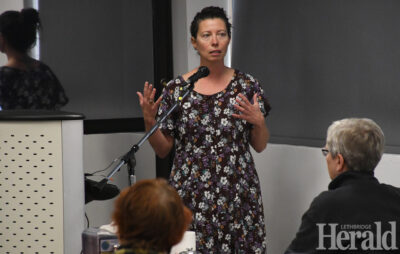Educating yourself key to understanding local food resiliency
By Ry Clarke - Lethbridge Herald Local Journalism Initiative Reporter on October 21, 2022.
 Herald Photo by Ry Clarke
Mandy Sandbach, President of the Lethbridge Sustainable Living Association, gives a talk on sustainable living and how to get involved in food resiliency Thursday at the Lethbridge Senior Citizens Organization
Herald Photo by Ry Clarke
Mandy Sandbach, President of the Lethbridge Sustainable Living Association, gives a talk on sustainable living and how to get involved in food resiliency Thursday at the Lethbridge Senior Citizens OrganizationThe Southern Alberta Council on Public Affairs (SACPA) has examined the benefits of relationships between sustainability and how our food resiliency can be beneficial to both ourselves, our environment, and the local economy.
On Thursday SACPA hosted Mandy Sandbach, president of the Lethbridge Sustainable Living Association, to lead the discussion.
“Part of the beginning step, especially for me and my journey, has been educating myself,” said Sandbach. “Where am I shopping? What are their policies? Where does their food come from? Start asking these questions about this. We have a huge agricultural resource here in southern Alberta. As you start to ask questions you can start to be able to make educated decisions in that direction.”
The Lethbridge Sustainable Living Association is a hands-on grassroots organization that works with local food security, sustainability, community building, and reducing waste.
“We have our fingers in a lot of different areas in that realm,” said Sandbach. “Rather than having everybody doing their own thing, part of what we try to do as an organization is connect those different pieces. Looking at what is Environment Lethbridge doing and how can we support that? Where are there gaps in the service of teaching hands-on skills?”
Working towards the goal of more than sustainability, Sandbach says we can do better and create a thriving regenerative community.
“Not just connecting yourself, but connection with yourself and family, your family and the community, the natural world and the ecosystems around you,” said Sandbach. “We cannot be self-sufficient; you can’t do all the things. You can try, but you are going to be an angry human at the end of it.”
Instead Sandbach suggests a look at community sufficiency where people come together and share their talents to help one another fill the gaps as they work towards sustainable living.
“The skills we can start sharing with one another to increase our sufficiency, our localized economies,” said Sandbach. “It’s not just about growing food, it’s about how we grow our human systems.”
With a goal of growing relationships and growing natural, the discussion helped create thoughtful outlooks on how we increase our food resiliency and community reach, while helping provide options for those dipping their feet into the waters of sustainable living. “Be visible in your journey,” said Sandbach. “The more drive and energy there is behind it, we can make better decisions if we are all being transparent.”
11-10




